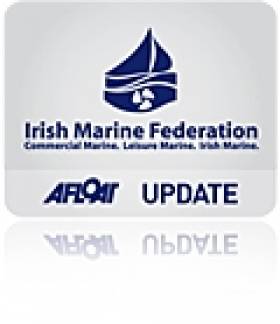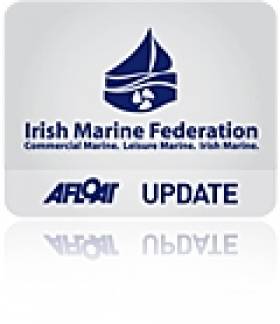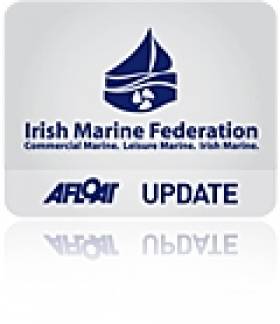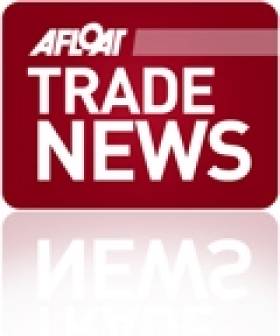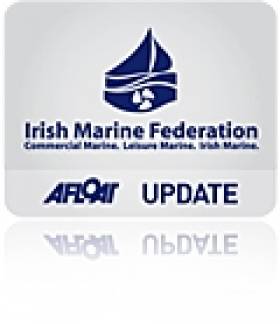Displaying items by tag: Irish Marine Federation
Ireland's First Irish Sea Marine Leisure Conference Planned
The Irish Marine Federation in its role as lead partner in the Interreg Programme, irish-sea.org, is currently working on the following projects. Executive Steve Conlon gives the following update to afloat.ie:
Marine Leisure Conference:
A conference to assist marine leisure companies to survive the current downturn on both sides of the Irish Sea is currently being planned. A number of high level speakers will be engaged to give advice on how to survive the recession and to bring forward development ideas to assist growth once the economies on both sides of the Irish Sea recover. The exact details of the speakers and the content is still being developed so if you have any suggestions for speakers or subjects to be covered please contact Steve Conlon. We intend this to be a seminal event of major importance to the industry so to ensure the maximum value can be gained for our members your input into the content and the context will be invaluable.
Coastal Communities:
The establishment of a number of Coastal Communities around our coasts to boast the marine leisure industry and to ensure that maximum number of marine leisure companies can benefit from the Interreg Programme. Two new coastal Communities about to get underway, Tralee Bay and Waterford/East Cork.
National Maritime Spatial Plan:
The Coastal Communities will also ensure that marine leisure becomes fully integrated into the national Maritime Spatial Plan when it is developed through contributing to a coastal audit of all marine leisure activities. Through our partners in South Wales, The Pembrokeshire Coastal Forum will assist us to produce an Integrated Coast Zone Policy for marine Leisure. This will be delivered through a number of workshops around the coast.
Marine Festivals and Events:
We have published the Social Economic Study into the value of the Volvo Dun Laoghaire Regatta: Copies of the study are available from Steve Conlon. The study provides an insight into the spend per boat, the tourism aspects of the event and also the visitor spend. Dun Laoghaire Rathdown County Council is using some of the data collected for another project that they are conducting into the development of a new brand image for the Town of Dun Laoghaire. The total value of the regatta is put at €2.4 million.
Irish-sea.org is also conducting a similar study for the Town of Wicklow who held a Sailfest in conjunction with the Conway Round Ireland Race. This study is still being compiled and the results will be published later in the Autumn. The Interreg Programme worked with both Wicklow Sailing Club and the local Wicklow Chamber of Commerce on the event and the study. Approx 10,000 people visited the town during the 3 days of the festival.
The Fenit based Coastal Community held a successful Seabreeze Festival as part of the Round Ireland Powerboat race. The Interreg Programme assisted the Community with several aspects of the event.
Business Training:
Several marine leisure businesses have benefited from the business training that is available through the County Enterprise Boards. If you wish to be involved in this activity please contact Steve Conlon.
Marina Management Training:
Irish-sea.org has been working with the British Marine Federation/Yacht Harbours Association to bring a number of courses to Ireland. We had hoped to run an "Intermediate Marina Managers" course in Ireland this year but this has now been but back until the spring of next year. The BMF will run a full Certified Marina Managers Course in Ireland in the Autumn. If there are any members who have the pre-qualifications for this course please contact Steve Conlon as the programme would like to assist as many of those who do qualify to participate. The BMF have chosen Ireland as the location to run this international course in competition with a number of other locations. Ireland came out tops in every respect from the well run marina facilities that they visited, travel access and transfer, conference and hotel facilities. Ireland as a venue came out tops in almost every criterion tested so from a marine leisure tourism perspective the holding of this prestigious course in Ireland may help put us on the map.
Contact: [email protected]
Irish Brokers on Look Out for More Boats to Sell
It might be the least expected outcome after a torrid two years in boat sales but now Irish brokers have few large boats left to sell. The scarcity stems from the fact that Irish second-hands have been snapped up by foreign bargain hunters over the past two years.
Irish businesses got a shot in the arm today with the news that UK VAT rates are to go up from 17.5% to 20%.The VAT differential will only be 1% compared to just over a year ago when it was 6.5%. "This makes large ticket items such as boats and equipment much more affordable at home and Irish business more competitive. It will help a lot with the problem of people crossing the border to shop" said Irish Marine Federation (IMF) chairman David O'Brien.
The Irish Marine Federation, an IBEC affiliated trade association, expressed concern at the implications for the marine industry when the UK Government reduced 2.5% to 15% with effect from 1 December 2008. It said then the effect would decimate the Irish Marine Industry, a forecast that proved correct.
British Chancellor of the Exchequer George Osborne increased the value-added tax rate to 20 percent from 17.5 percent in the first permanent change to the levy on sales of goods and services in almost two decades.
"The years of debt and spending make this unavoidable," Osborne told Parliament in London in his emergency budget today as he announced a package of spending cuts and tax increases to cut the U.K.'s record deficit.
The Federation, that represents, the marine leisure industry has also renewed its call for VAT on safety equipment such as lifejacket and radios to to be abolished.
A turnout estimated in excess of 350 people produced Euro 500,000 in sales at a Used Boat Show in Dun Laoghaire at the weekend. The Coal Harbour based marine firm, MGM Boats Ltd say the three day show led to at least seven boat sales. The boats, both sail and power craft, were from the company's brokerage list and represented a significant uplift in business. "The mood has changed, show goers were drawn from our existing customers and those definitely interested in boating", said the firms Gerry Salmon.
Sales of boats varied from a Moody 31 Sailing Cruiser that is staying locally to Jeanneau motorboats; a leader 805, a Prestige 34 foot and Prestige 30 foot. Deposits were also taken on a Sea Ray 250 DA speedboat, a small brig RIB and a Maxum 25 speedboat.
Marine Federation is Navigating Beyond the Gloom
The Irish marine trade is recovering lost ground this spring according to the Irish Marine Federation's Mark McAuley. Having discussed market conditions with market leaders, it is clear that the market’s appetite for boats and boating holidays has improved – “As an industry, we sat down and took a hard look at the way things are going after a long dark winter for the industry. The great news is that boat sales are up around 30% compared to spring 2009. This increase is from a low base, but it’s good to see an upturn. Consumers are responding to the very competitive prices that are being offered by boat sellers to encourage people back into the market.”
Boating holidays on the Shannon are proving more popular. According to McAuley, “The hire boat fleet on the Shannon has shrunk somewhat over the last few years but bookings are up compared to last year and a bit of good weather could deliver a good season. Things have been helped by Bord Failte’s marketing of boating holidays to the Irish and continental European markets.”
“The marinas are also starting to fill up again. Since 2008 berths became readily available where once there were none, but the marinas have responded by lowering their prices and occupancy rates are rising in the major boating centres of Dublin, Cork and elsewhere.”
“Whilst the marine leisure market peaked like many others in 2006 and still has a long way to go if it is to reach those sorts of levels again, it is good to see that consumers are beginning to respond to the new pricing across the industry. There is an acute awareness that consumers are looking for value for money but, once they see it, there is now a willingness to buy.”
“Business costs remain a real problem, especially in light of falling prices. Rent and rates are big fixed costs and should have reduced in line with the market, but upward only rent reviews are blocking this. Competition in the domestic market is intense and our punitive VAT rate has eroded our competitiveness against UK suppliers.”
“The Irish Marine Federation is working hard to assist the industry and ensure it is well placed to take advantage of these small upswings in the market. The recession has had a huge impact on the industry and many companies have not survived, but the core of the industry is still there doing business. They are leaner and eager to keep people engaged in boating around our coasts and on our inland waterways. We have a wonderful marine environment and it’s great to see people out there enjoying it. No industry could ask for better a better foundation than that.”



























